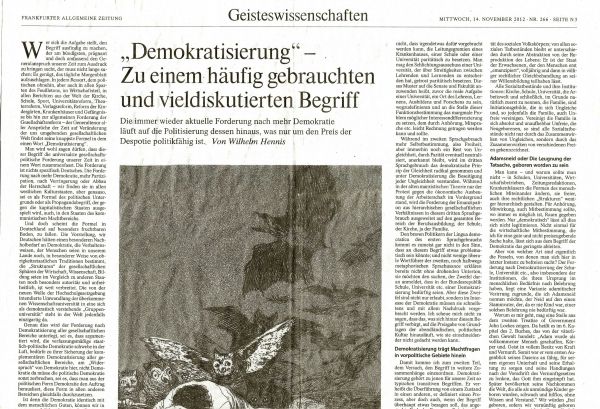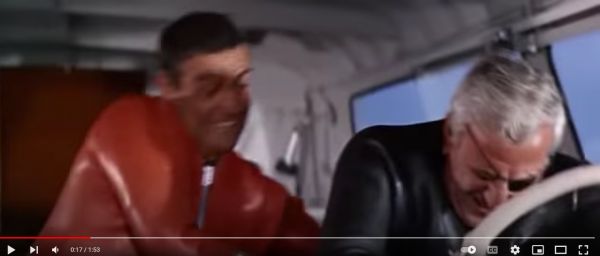From the Dissenter's Dictionary: The Democratic Ideal—not so ideal?
During a trip to Germany a few years ago, I was sitting at breakfast reading newspapers and saw an article with a line that read "Agitators pressure our nation to democratize its institutions; but if they do this, will they make the society more compulsory?"
The author of the article, a constitutional scholar Wilhelm Hennis, had died three days earlier, and the Frankfurter Allgemeine newspaper published the article in Hennis's memory on November 13, 2012, as a sort of protest against the direction of the German nation.
Hennis's article raises valid points about America's own push to democratize:
- Do we identify democracy as the ideal in a human society?
- If we make society more democratic, do we make it freer?
- Do we judge the loyalty of a citizen by his adherence to majority opinions and majority rule?
- Will majoritarians see dissent as an attempt to defeat the democratic process?
- Will democratization defeat the capitalist elite? And all other elites for that matter?
For most Americans, "democracy" is hardly more than a sanctified buzzword, like "transparency," "civil rights," or "human dignity." It has accumulated presumptions in its repeated use—that Hennis calls Srachhülsen—that define democracy for the general public and give it a gravitas it does not deserve. Terms like "Democracy" gain a moral momentum that surpasses common sense, that does not take into account its limitations and risks.
For one thing, a democracy puts dissenters at risk. They will have to keep claiming their right to voice dissent to the mandate of the majority. "Practical reason will take a back-seat to moralistic drama," Hennis warns, "as the audience checks every objection for signs of anti-democratic subversion."
The forces for democratization never mention that the Founding Fathers of our country expressed grave concerns about democracy. Here are a few instances:
- James Madison's "anti-democratic ethos was rooted in the conviction that political popularity generated a toxic chemistry of appeasement and demagoguery, that priviliged popular whim and short-term interests at the expense of long-term public interest." (from The Quartet, by Joseph Ellis.
- John Adams: "Democracy never lasts long. It soon wastes, exhausts, and murders itself. . . . It is vain to say that democracy is less vain (or) avaricious than aristocracy or monarchy. . . . Those passions are the same in all men." Excerpt of a letter to John Taylor, who was a friend of Thomas Jefferson's.
- Alexander Hamilton: "A sacred respect for the constitutional law is the vital principle, the sustaining energy of a free government."
- The Founders "straddled an aristocratic world that was dying and a democratic world that was just emerging, theoretically an awkward posture that they managed to make into a graceful synthesis called 'republic'.
"It has endured . . . because it manages to combine two time-bound truths. . . . Any legitimate government must rest on a popular foundation, and that popular majorities cannot be trusted to act responsibly, a paradox that has aged remarkably well." (from The Quartet)
America's dilemma—the efforts of Republicans and Democrats to steer the society while they carry on their squabbles over policy, reminds me of the climactic fight scene in the movie Thunderball, from 1965.
The terrorist Emilio Largo tries to escape with a stolen nuclear bomb on board the Disco Volante, his turbo-charged boat, and James Bond has to stop him. But the Disco Volante, flying along at a hundred-miles-an-hour through coral reefs, with a bomb on board, needs someone to steer it!
While Bond and Largo fight, they also have to keep an eye on the boat to keep it from crashing on the reefs. Largo steers the boat while Bond has him in a choke-hold, then Bond steers while Largo has a choke-hold on him. Both the terrorist and the hero take turns at the wheel:
James Bond in red, played by Sean Connery;
Emilio Largo in black, played by Adolfo Celi;
The parallel to our embattled country should concern Americans. We should also remember that the Constitution continues working as a sort of auto-pilot, during the political commotion, to keep the nation off the reefs, more or less confirming Joseph Ellis's statements on the subject.





